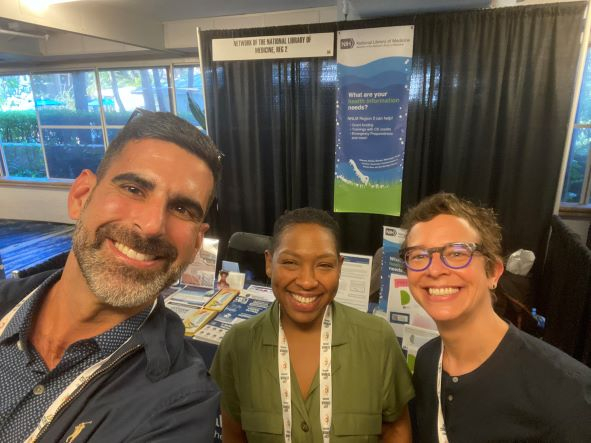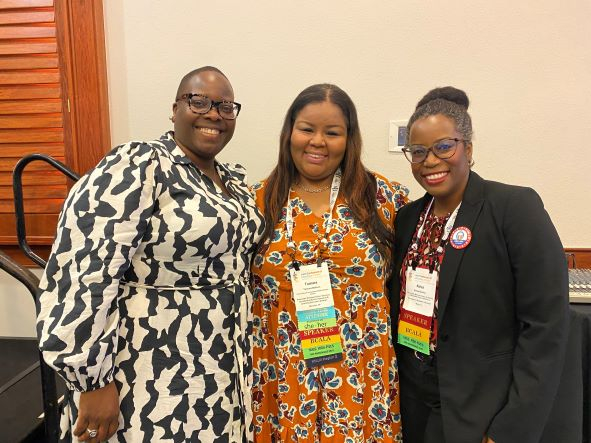My extraordinary experience at the 4th National Joint Council of Librarians of Color (JCLC) Conference

Image: Author visiting the Network of the National Library of Medicine (NNLM) exhibitor booth crewed by Lorin Jackson, NNLM’s Region 2 Executive Director and Sarah Fischer, Community Engagement and Outreach Strategist.
I identify as a first-generation Cuban-American, Latinx, white, gay, cisgender male living in South Florida where, in most spaces, I am part of the majority. I understand that, even though I am a member of many underrepresented communities that are aggressed daily, I experience higher levels of privilege than my black, indigenous, and other people of color (BIPOC) peers. I also acknowledge that much of the community I reside in supports the current targeted legislation that is affecting our libraries and democracy.
The statement above is called a positionality statement; a statement that places the author’s identity in relation to their work whether it be curating an exhibition or writing a research article. You might not have heard of one. I didn’t either until I attended the 4th National Joint Council of Librarians of Color (JCLC) Conference, held in St. Pete Beach, FL on February 8-12th. JCLC is organized every four years by the American Library Association’s (ALA) American Indian Library Association (AILA), the Asian/Pacific American Librarians Association (APALA), the Black Caucus of the American Library Association (BCALA), the Chinese American Librarians Association (CALA), and REFORMA: The National Association to Promote Library & Information Services to Latinos and the Spanish-speaking to advocate for ALA’s ethnic affiliates.”1 It was hard to fathom that an Equity, Diversity, and Inclusivity (EDI) conference for librarians of color was held in a state where legislation bans diversity and LGBTQIA+ books, discussions, and events, where conservative parent groups require filters for research databases, where plans are underway to eliminate black history courses, and where defenses for librarians and educators from obscenity prosecutions have diminished. As one opening session presenter exclaimed, “Florida is the testing ground for what is happening nationally.”

Image: Dr. Shannon Jones, Director of Libraries at Medical University of South Carolina, Tamara Nelson, Senior Research & Learning Services Librarian at the University of Tennessee Health Sciences Center and Kelsa Bartley, Education & Outreach Librarian at the University of Miami Miller School of Medicine after their presentation titled, “Braving Our Blind Spots: Using a Virtual Book Discussion Group to Continue Conversations on Implicit Bias in Libraries.
JCLC was instrumental in developing many skills I should be practicing in my career and in life, and my hope is that nationally we can as well. For one, listening and communicating effectively during these turbulent times is paramount. As I attended sessions, I wrestled with asking presenters questions or sharing my thoughts on topics being discussed, fearing negative feedback. During the “Armed with Intellectual Freedom: Current Challenges and Next Steps” session, I found the courage to share my opinion on the topic of paraprofessionals and banned books in school libraries due to Florida legislation known as the “Don’t Say Gay” Bill. The most detrimental scenario in my mind came true. A paraprofessional stated that she was offended by my point of view, shared her experience, and challenged my thinking. While she spoke, I felt extremely uneasy and felt like disappearing. Rather than wallowing in shame, I approached her after the session to discuss our comments. My last intention was to belittle her work ethic and commitment to the library profession. After our conversation, I was able to move on and allow myself to welcome the energy and excitement that comes from such professional development opportunities. Conversations can be challenging given the times we live in, but we always have the option to turn in to one another. Learning can be uncomfortable, and that is ok.
In fact, one of the unique features of JCLC is the daily Call-to-Action sessions to promote dialogue and process feelings. After a full day of activities and sessions, conference participants gathered collectively for reflection. As a society, we rarely reflect on what we learn and more rarely reflect collectively, both extremely powerful practices. The Call-to-Action sessions were safe spaces to spur action plans and identify what can be done once we return to our local communities. These sessions became a charge to foster change. I was saddened to bear witness to the injustices by way of stories during these sessions. I witnessed the burnout and ill feelings experienced by those involved in EDI in their workplaces or through lived experiences as BIPOC. There was hope when I saw how colleagues consoled one another, emphasized self-care, and brainstormed possible actions to combat daily difficulties. At one point, when feelings were deep, we participated in the practice of gratitude by naming our lineage and honoring our ancestors. The simple practice of mindfully naming our ancestors’ out loud made us feel grateful for where we are today by honoring those that have made sacrifices in our lives. Practices like these are extremely helpful when one is feeling overwhelmed. Given that the fight will be ongoing, our well-being is essential. The JCLC conference moderators emphasized and encouraged self-care as a non-negotiable aspect in our lives. Building the personal capacity to bring about change involves radical self-care, reflection, and the sharing of micro-affections to combat the ills that are in our home spaces and endangering our professional values.
JCLC was instrumental in my continued development in becoming an effective force to bring about needed change. Conferences become a place where hallway conversations and connections occur and ideas flourish, something that virtual meetings cannot offer. Being present amongst like peers is amazing and informed me of my privilege. I am grateful to work at an educational institution that values EDI and LGBTQIA+ initiatives. My institution has a free-standing LGBTQIA+ student center and an active faculty/staff group that coordinates engaging programming and activities. It is beautiful to work for an organization that values and encourages DEI initiatives. Sadly, this is not the experience of most BIPOC conference attendees and may not be guaranteed under current legislative attacks.
JCLC aligns with my values: to become an agent of change during these difficult times. What message do I have for my fellow medical librarians after attending JCLC? I encourage all library colleagues of color and allies to find ways to lean into being uncomfortable to make things better for everyone in our communities. This work will challenge our comfort levels and communication skills and will require us to exercise daily self-care practices. Everyone should make great strides in loving themselves and create actions that bring us all together. As RuPaul, the mother of drag, states, “If you can’t love yourself, how in the hell you gonna love somebody else?” Amen.
Experiencing the JCLC conference has echoed my strong belief that EDI efforts are beneficial for us all.
- Joint Council of Librarians of Color (JCLC) https://www.jclcinc.org/
Jorge E. Perez is currently the Instructional and Information Services Librarian in the Research & Clinical Information Services Department at the Louis Calder Memorial Library, University of Miami Miller School of Medicine in Miami, FL.

